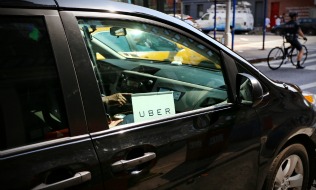

Toronto drivers for Uber Technologies Inc.’s premium Black service are fighting to bring themselves one stop closer to unionization and being recognized as employees of the popular ride-sharing app.
The United Food and Commercial Workers Union appeared in a virtual Ontario Labour Relations Board hearing on Friday to represent Uber Black limousine and SUV drivers working in and out of Toronto Pearson International Airport and downtown Toronto.
The union applied for unionization in January on behalf of 300 of those workers and believes it has met the threshold of support needed to gain certification as the official bargaining agent of the drivers. Uber told The Canadian Press that the benchmark is 40 per cent of the Black driver population, which it disputes has been met.
Read: Uber Toronto drivers unionizing for minimum wage, sick and vacation days
The two sides spent most of Friday arguing about what criteria should be used to determine whether the threshold was met.
When asked about the proceedings and unionization, Uber stressed that its platform enables drivers to earn money on their own terms because they control where and when they work, and are free to use other apps at the same time as they’re on Uber.
“We are constantly working to get feedback from drivers and improve their experience while maintaining the main thing they love about it, having flexible work,” the company said in a statement to The Canadian Press.
Read: Union asks B.C. labour board to designate Uber, Lyft drivers as employees
The union believes the proceedings could help drivers be recognized as employees of Uber, a matter the company says will be dealt with at a subsequent hearing.
“The rights of Uber drivers are still being abused, and we continue to be taken advantage of,” Irfan Muhammad, a Toronto-based Uber Black driver, said in a statement.
“We need union representation to help ensure that we are paid for the hours that we work, to provide just cause protection so that drivers do not lose their jobs from a single bad rating, and to make sure that we are treated fairly as business returns and we start to come out of this crisis.”
Read: Foodora couriers attempting to unionize for better pay, benefits
COVID-19, he said, has “significantly” reduced demand for rides, which means that drivers are facing a loss of income and have few protections because they are gig workers.
The battle he’s involved with comes roughly a month after Berlin-based Delivery Hero SE shut down its Foodora app in Canada on May 11, saying “we’ve been unable to get to a position which would allow us to continue to operate without having to continually absorb losses.”
Foodora workers wanted fair compensation for the work completed by couriers and argued that the pay-per-order model meant that during slow periods workers receive wages lower than minimum wage, while still covering costs like gas, phones and vehicle or bike repairs.
Read: Foodora couriers allowed to unionize, rules Ontario labour board
Foodora has long boasted about its app offering flexibility so people just trying to earn some extra cash or between jobs could easily make money, but workers said that flexibility bred instability and left them with little protection.
They took their fight to the Ontario Labour Relations Board, which ruled in February that Foodora couriers are dependent contractors of the food-delivery company because they more closely resemble employees than independent contractors.
The ruling helped the workers clear a massive hurdle towards unionization and was taken as a promising sign by other gig workers toiling away in similar conditions.
